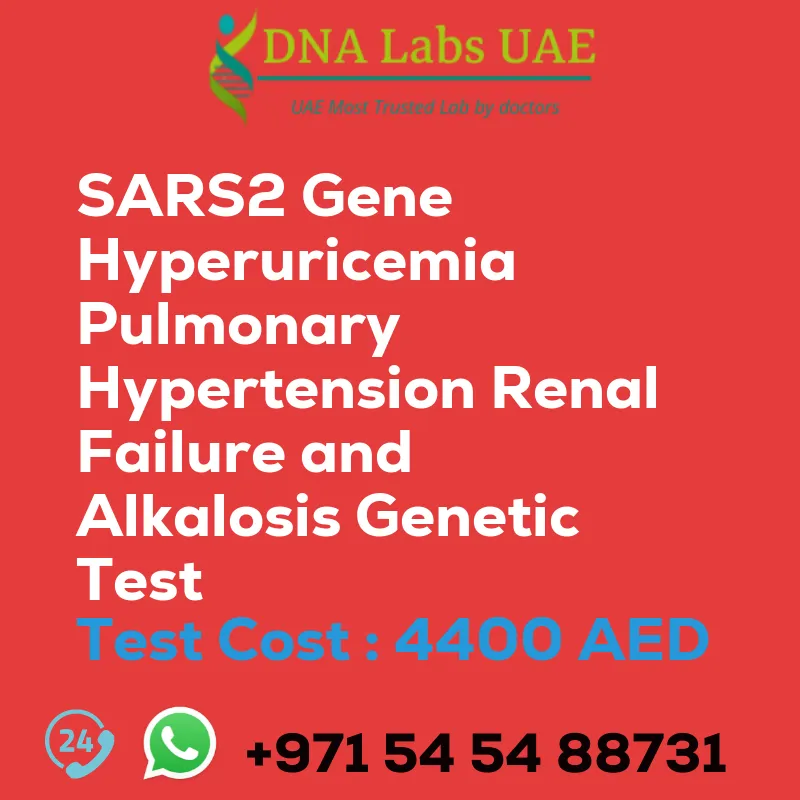SARS2 Gene Hyperuricemia Pulmonary Hypertension Renal Failure and Alkalosis Genetic Test
Welcome to the DNA Labs UAE blog, where we provide detailed information about our genetic testing services. In this blog post, we will discuss the SARS2 Gene Hyperuricemia Pulmonary Hypertension Renal Failure and Alkalosis Genetic Test.
Test Name: SARS2 Gene Hyperuricemia Pulmonary Hypertension Renal Failure and Alkalosis Genetic Test
Components:
- Price: 4400.0 AED
- Sample Condition: Blood or Extracted DNA or One drop Blood on FTA Card
- Report Delivery: 3 to 4 Weeks
- Method: NGS Technology
- Test Type: Hepatology Nephrology Endocrinology Disorders
- Doctor: General Physician
- Test Department: Genetics
Pre Test Information:
Before undergoing the SARS2 Gene Hyperuricemia Pulmonary Hypertension Renal Failure and Alkalosis Genetic Test, it is important to provide the clinical history of the patient. A genetic counseling session may also be conducted to draw a pedigree chart of family members affected by the conditions related to the SARS2 gene.
Test Details:
SARS2 gene hyperuricemia, pulmonary hypertension, renal failure, and alkalosis are health conditions that may be associated with genetic variations in the SARS2 gene. To confirm the genetic basis of these conditions, a next-generation sequencing (NGS) genetic test is performed. NGS genetic testing involves analyzing the individual’s DNA to identify any genetic variations or mutations that may contribute to their health conditions. Specifically, the NGS test focuses on sequencing the SARS2 gene to identify any variants present.
Hyperuricemia is characterized by elevated levels of uric acid in the blood, which can cause gout. Pulmonary hypertension refers to high blood pressure in the lungs’ arteries, potentially leading to heart failure. Renal failure is the loss of kidney function, resulting in waste product accumulation and electrolyte imbalances. Alkalosis is a condition where the body’s pH becomes more basic than normal, disrupting bodily functions.
The NGS test for the SARS2 gene can help healthcare professionals understand the underlying cause of these conditions by identifying genetic variations. This information can guide treatment decisions, provide personalized medical management, and potentially inform family members about their risk of developing similar conditions.
For more information about the SARS2 Gene Hyperuricemia Pulmonary Hypertension Renal Failure and Alkalosis Genetic Test or to schedule an appointment, please contact our Genetics Test Department or consult with a General Physician.
| Test Name | SARS2 Gene Hyperuricemia pulmonary hypertension renal failure and alkalosis Genetic Test |
|---|---|
| Components | |
| Price | 4400.0 AED |
| Sample Condition | Blood or Extracted DNA or One drop Blood on FTA Card |
| Report Delivery | 3 to 4 Weeks |
| Method | NGS Technology |
| Test type | Hepatology Nephrology Endocrinology Disorders |
| Doctor | General Physician |
| Test Department: | Genetics |
| Pre Test Information | Clinical History of Patient who is going for SARS2 Gene Hyperuricemia, pulmonary hypertension, renal failure, and alkalosis NGS Genetic DNA Test. A Genetic Counselling session to draw a pedigree chart of family members affected with SARS2 Gene Hyperuricemia, pulmonary hypertension, renal failure, and alkalosis NGS Genetic DNA Test gene SARS2 |
| Test Details | SARS2 gene hyperuricemia, pulmonary hypertension, renal failure, and alkalosis are all health conditions that can potentially be associated with genetic variations in the SARS2 gene. To confirm if there is a genetic basis for these conditions, a next-generation sequencing (NGS) genetic test can be performed. NGS genetic testing involves analyzing the individual’s DNA to identify any genetic variations or mutations that may be contributing to their health conditions. In the case of SARS2 gene-related conditions, the NGS test would specifically focus on sequencing the SARS2 gene to identify any variants that may be present. Hyperuricemia is a condition characterized by elevated levels of uric acid in the blood, which can lead to the formation of urate crystals in the joints and cause gout. Pulmonary hypertension refers to high blood pressure in the arteries of the lungs, which can strain the heart and lead to heart failure. Renal failure is the loss of kidney function, which can result in the accumulation of waste products and imbalances in electrolytes. Alkalosis refers to a condition where the body’s pH becomes more basic than normal, which can disrupt various bodily functions. By identifying genetic variations in the SARS2 gene, the NGS test can help healthcare professionals better understand the underlying cause of these conditions. This information can be used to guide treatment decisions, provide personalized medical management, and potentially inform family members about their risk of developing similar conditions. |







